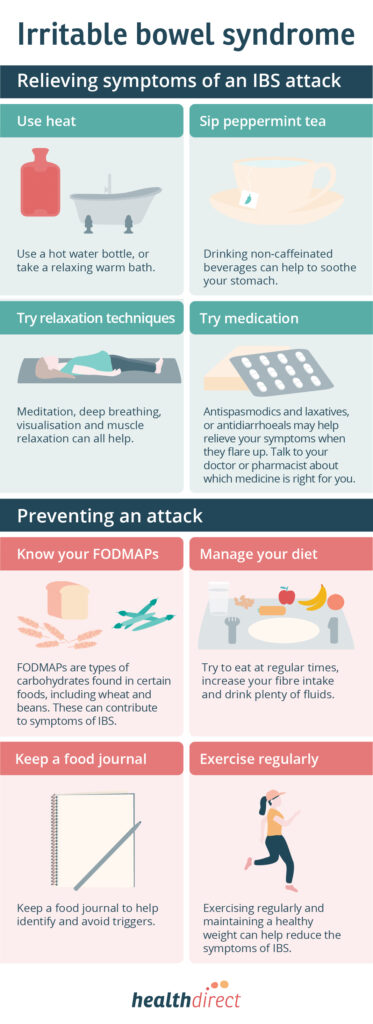April is Irritable Bowel Syndrome Awareness Month.
Irritable Bowel Syndrome is a disorder which affects parts of our large intestine also known as the colon (1). IBS can also be called spastic colon, irritable colon, mucous colitis or spastic colitis, and commonly manifests as stomach pain (3).
IBS affects around 6-18% of people world wide and is more common in women than men (4).
What does IBS feel like?
- Abdominal pain, cramping or bloating
- Irregular bowel habits (diarrhoea, constipation or both)
- Food intolerance
- Fatigue and difficulty sleeping
- You can experience any combination of these symptoms, and could also disappear and return later.
Symptoms are different for everyone (4).
What causes it?
While the direct cause of IBS is unknown, we know several factors which can contribute to the onset of symptoms (1). Common triggers include diet, stress and medications.
How is IBS diagnosed?
Visiting your GP can provide you with more information on IBS symptoms and a potential diagnosis. A professional will try to rule out any other conditions you may possibly be experiencing before treating you for IBS. These tests include blood or stool testing for infections or allergies, or a colonoscopy to check for conditions such as colitis or cancer (1).
What can you do to improve symptoms?
As different triggers affect people differently, you should try to find a treatment that suits you, such as: (3)
- Avoid caffeine
- Avoid deep fried or spicy food
- Increase high fiber food intake
- Avoid trigger foods (foods which directly cause an increase in symptoms)
- Try a FODMAP diet
:max_bytes(150000):strip_icc()/how-to-deal-with-an-ibs-attack-1945092_final-5c04b43f46e0fb0001de868e.png)
What is a FODMAP diet?
FODMAPs are different types of sugars found in food that are poorly absorbed by our bodies during digestion (2). Foods that are high in FODMAPs are commonly triggers for IBS symptoms.
Common high FODMAP foods to avoid include:
- dairy, onion, apples, wheat, peas and chick peas.
Common low FODMAP foods to increase include:
- plain cooked meats, rice, eggs, red capsicum, oranges, dark chocolate and peanuts
If you think trying a low FODMAP diet will improve your symptoms, consider speaking to a dietician first to make sure you change your diet safely. It is recommended that you only eat a low FODMAP diet for 2-6 weeks at a time, followed by slowly reintroducing foods to find your trigger foods (2).
It’s important to note that food is not the only trigger for IBS symptoms. This means that if a change in diet does not resolve your symptoms, it’s likely you will find help looking at other triggers such as caffeine, stress, exercise and probiotics.

Find more of our health tips blogs here.
Sources:
(1) Health Direct. 2020. Irritable bowel syndrome (IBS). https://www.healthdirect.gov.au/irritable-bowel-syndrome-ibs
(2) Health Direct. 2020. Low fodmap diets. https://www.healthdirect.gov.au/low-fodmap-diets
(3) Herndon, J. 2019. Everything you want to know about IBS, Healthline. https://www.healthline.com/health/irritable-bowel-syndrome
(4) Thorpe, M. 2019. 9 signs and symptoms of irritable bowel syndrome (IBS), Healthline. https://www.healthline.com/nutrition/9-signs-and-symptoms-of-ibs
